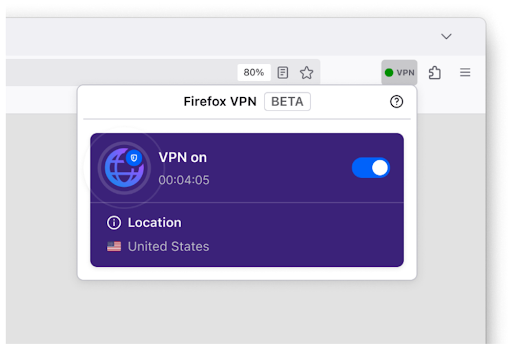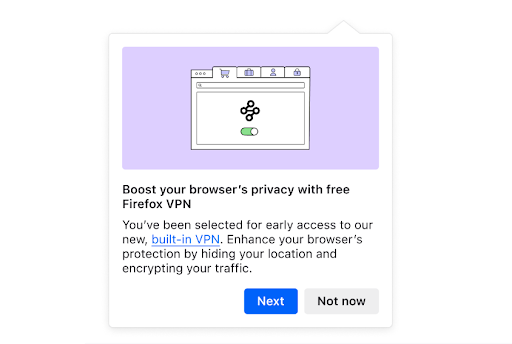Mozilla is experimenting with a free, built-in VPN in Firefox – but you might not be able to try it yet
Firefox VPN marks a big departure from Mozilla VPN

Sign up for breaking news, reviews, opinion, top tech deals, and more.
You are now subscribed
Your newsletter sign-up was successful
- Mozilla has just launched Firefox VPN, and it's now in beta
- Firefox VPN is a free, browser-only feature built into Firefox
- Mozilla also has its own standalone VPN client, but the two are wildly different
Mozilla has just started testing what it refers to as a "new experiment:" Firefox VPN.
This is a free, browser-only VPN that's built directly into the Firefox browser and is currently available in beta.
The company says that it'll start simple with a pretty barebones VPN service and then evolve the feature based on user feedback.
However, Mozilla has an ambitious goal ahead, as the company claims that it wants to "build the best VPN-integrated browser on the market."
Here's everything we know about Firefox VPN so far, including how it compares to Mozilla VPN and how to join the beta.
What is Mozilla's Firefox VPN?

Firefox VPN is a new, free, browser-only VPN feature built directly into Mozilla's Firefox browser.
It's currently in beta testing and is designed to encrypt and route only the traffic that passes through Firefox, rather than protecting your entire device.
In practical terms, it hides your IP address and prevents websites, trackers, or network providers from seeing your true location or browsing activity, but only within Firefox itself.
As Mozilla VPN uses Mullvad servers, chances are that Firefox VPN does too, although the company doesn't elaborate on that in its announcement.
Right now, you can only connect to the nearest stable server, so users in the United States will also be connecting to the US, for example. This means that if you want to watch Netflix from other countries, you'll still need to use a standalone VPN or a different VPN browser extension.
Mozilla says it will only collect some necessary technical data, such as connection status and how much data you've used on a given day, and store these for three months. It won't store information about the websites you've visited while using Firefox VPN.
How can you join the Firefox VPN beta?

If you want to join the beta, you might need to be patient. Mozilla is selecting testers at random, so you may or may not get in. The one thing you'll definitely need is a Mozilla account.
Once you've been selected, you'll see a prompt in the Firefox toolbar. You can then either choose to opt in and log on to your Mozilla account to activate the VPN, or pass on the opportunity by selecting "not now" and then "no thanks." Doing this removes the icon from the toolbar.
To turn on Firefox VPN, click the VPN icon from your toolbar and toggle it on. It'll automatically pick the closest server to you.
There are no usage and bandwidth limits for testers.
What's the difference between Mozilla VPN and Firefox VPN?
Firefox VPN and Mozilla VPN have one main thing in common – they both come from the same company. Other than that, they're different products in most ways.
For starters, Firefox VPN is free, and Mozilla VPN is a paid service. The former is a browser-only tool, and the latter is a full-on VPN client that protects your entire device.
Mozilla VPN offers advanced features such as split tunneling, flexible multi-hop connections, and ad blocking, and it runs on the WireGuard VPN protocol. Meanwhile, Firefox VPN doesn't interfere with your connection outside of when you use the browser.
Although Mozilla VPN can’t rival some of the best, such as NordVPN, the service keeps evolving. Mozilla recently made its proprietary VPN available on all Linux distributions.
It remains to be seen if Firefox VPN will evolve into a service able to compete with the best free VPN options out there. Mozilla is certainly trying and hopes its users will help with this endeavor.
You might also like

Monica is a tech journalist with over a decade of experience. She writes about the latest developments in computing, which means anything from computer chips made out of paper to cutting-edge desktop processors.
GPUs are her main area of interest, and nothing thrills her quite like that time every couple of years when new graphics cards hit the market.
She built her first PC nearly 20 years ago, and dozens of builds later, she’s always planning out her next build (or helping her friends with theirs). During her career, Monica has written for many tech-centric outlets, including Digital Trends, SlashGear, WePC, and Tom’s Hardware.
You must confirm your public display name before commenting
Please logout and then login again, you will then be prompted to enter your display name.